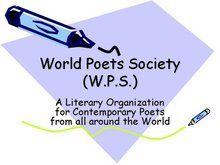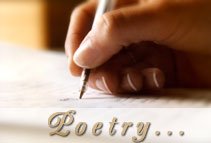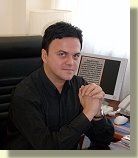Biography:
In 1983 he was awarded a San Francisco Arts and Letters Foundation cash award for his contribution to small press literature. In 2006 he received a PEN National Josephine Miles award for literary excellence.
He has read his poetry with many acclaimed poets including Lawrence Ferlinghetti, Jack Hirschman, Diane DiPrima, and the late Charles Bukowski, Jack Micheline, and Bob Kaufman.
His poetry, prose, essays and book reviews have appeared in over a thousand literary magazines and anthologies, including City Lights Journal, Poetry Australia, the New York Quarterly, Beat Scene, Beatitude, Rattle, The Smith, The American Poetry Review (APR) The Outlaw Bible of American Poetry (Thunder’s Mouth Press), and Inside the Outside (Presa Press). His poetry has been translated into nine languages. A song poem of his was performed in April 2004 at Tully Hall, New York City. Such noted poets and writers as Colin Wilson, Studs Terkel, James Purdy, Peter Coyote, Jack Hirschman, and the late Jack Micheline and Charles Bukowski have praised his work. In January 2007 Presa Press published a book of his selected poems.
He has worked at a variety of jobs, most recently with the U.S. Department of Education (Office for Civil Rights), as an Equal Opportunity Specialist, investigating claims of discrimination against minorities, women, and the disabled.
Winans is a member of PEN, and has served on the Board of Directors of many arts organizations, including the now defunct Committee of Small Press Magazine Editors and Publishers (COSMEP). He is listed in Who’s Who in America, The International Directory of Who’s Who in Poetry, The Gale Research Contemporary American Authors the Gale Research Contemporary Authors Autobiography Series and Who’s Who In America. His essay on the late Bob Kaufman was published in American Poetry Review and was republished in January 2007 by the Writer’s Research Group. His archives and those of Second Coming Magazine/Press are housed at Brown University.
1. On My Way To Becoming A Man
On my way to Lackland Air Force Base
The train stopped to take on passengers
Giving me the chance to get off
Stretch my legs and relieve myself
On returning from the men’s room
An elderly black man approached me
Wanting to know where the restroom was
And when I pointed in the direction
Of where I had just come from
He shuffled his feet nervously
And said, “No, the colored room”
And being naïve and from the North
I had no idea what he was talking about
When suddenly a woman came running
Out from behind a concession stand
Her face red with anger
Yelling for the old man
To leave me alone
As I tried in vain
To calm her down
Telling her it was all right
He was only looking for the
Men’s room
“That boy knows where the colored room is”
She said, shooing the old man away
As I boarded the train
Turning to see him
Bent over a “colored” only
Water fountain
Ss the train picked-up steam
Sparks flying from the tracks
Taking me on my way
To becoming a man
Where I would have
My serial number branded into
My head
And made to wear a dog tag
Around my neck
To remind me
I was the property
Of Uncle Sam
2. Panama Ten
Two political prisoners were sitting
In their jeep with two
Panamanian National Guardsmen
Outside a bar in town
The two Panamanian Nationals
Went inside to check the bar
Leaving the two men
Handcuffed outside alone
Once inside the guardsmen spoke
To the bartender
In a language
I couldn’t understand
When suddenly there was an explosion
Coming from outside the bar
And without looking the
Two guardsmen laughed
And downed their tequila and beers
While outside you could see the
Flames engulf the jeep
The two prisoners lit up
Like two scarecrows
Tossed into
A bonfire
3. Panama Memories
The young Panamanian girl
Sitting alongside
Her sister dressed only
In panties and bra
Reading a comic book
And chewing on bubble gum
At a brothel called the
Teenage Club
Waiting for the first
GI’s to arrive
Six girls lined-up
Like bowling pins
Rooted to the long
Wooden bench with
Zombie like stares
Doing a woman’s thing inside
A child’s body
4. Returning Home From Panama
They had this bar at Ocean beach
Called the Chalet
It used to be a hangout for vets
The American Legion boys
Most of them fat and balding
The years piling up like litter
One so old that
He claimed he was gassed in
WW 1
You never knew whether
To believe him or not
He just sat there staring
Talking into his beer
Humming a song:
OVER HERE OVER THERE
And using terms like
Dough Boy and Pill Box
And you just somehow knew
He had to have been there
Was still there would always
Be there
5. The System
There are old men and women
Who have worked all their lives
Who have put in three
Four decades for the
Right to a pension
There are old people who have
Worked twenty years or more
Only to be laid off and given
Two weeks severance pay
To seek a living at half the pay
There are old people
Who have worked all their lives
Only to witness the company
Go belly-up
And find there is no pension
Fund left
You can find them on park benches
Or wandering sterile supermarkets
Or sitting at neighborhood bars
Nursing drinks like
A blood transfusion
They come in assorted flavors
Like “Life Savers”
Some thin and balding
Some fat and sweating
Some complaining bitterly
Some too proud to let the pain show
Trapped by a belief in a system
That has abandoned them
For the most part they suffer
In silence, duly unnoticed
To be carted off in meat wagons
To be cut open by coroners
Who see them as morning cereal
Who go about their business
Like a butcher
Thinking of dinner
Thinking of a glass of wine
Thinking of how it used to be
How it might have been
How it should have been
It’s the way of life
It’s the way of politicians
And mice
It’s the system where
Just trying to stay alive becomes
A small victory
© A. D. Winans










